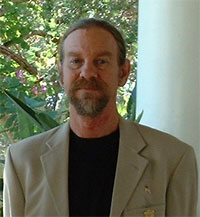Augustus LePlongeon
Churchward, Jack E.
Jack E. Churchward is the great-grandson of James Churchward, the creator  of Mu. In 2011 Jack republished what he describes as the definitive edition[773] of James’ 1926 The Lost Continent of Mu which includes a new index and added appendices. It is still just the concoction of a fertile mind. My scepticism and that of many others is reflected in a recent blog from Dale Drinnon(a).
of Mu. In 2011 Jack republished what he describes as the definitive edition[773] of James’ 1926 The Lost Continent of Mu which includes a new index and added appendices. It is still just the concoction of a fertile mind. My scepticism and that of many others is reflected in a recent blog from Dale Drinnon(a).
>For the record, Jack is quite sceptical of his great-grandfather’s theories and has republished some of the earlier material in order “for the reader to evaluate the basis of his argument,”<
Jack has also a promotional website(b), where he candidly wrote(c) that “the Troano Manuscript, as a reference for the sinking of Mu, must be removed from the list, if there is to be any legitimacy accorded to an evaluation of Churchward’s theories on Mu.” Jack was highlighting the unreliability of James’ translation of the Troano Manuscript, influenced as it was by the earlier seriously flawed attempts by Bishop Diego De Landa (1524-1579), Brasseur de Bourbourg and LePlongeon. Jason Colavito has added further comments(d) regarding Jack’s blog.
Jack continued to explore his great-grandfather’s misguided ideas with the publication of The Stone Tablets of Mu [1577] in August 2018.
>In 2019, Jack published Crossing the Sands of Time: An Examination of the History and Legends of the Great Uighur Empire [1778]. We are told that “This book was motivated by the author’s interaction with Uyghur scholars and the marked difference between the real history and that espoused by his great-grandfather, James Churchward. During the research, other theories surfaced and are addressed as well. Included are appendices containing all the elder Churchward’s mentions of the Uighurs allowing the reader to judge for themselves the veracity of his pronouncements.”<
(b) https://www.my-mu.com/bstore.html
(c) https://blog.my-mu.com/?p=2272
(d) https://www.jasoncolavito.com/blog/the-weird-case-of-atlantis-mu-in-the-madrid-codex
Dendl, Jörg (t)
Jörg Dendl was born in 1964 and studied ancient history at the Friedrich Meinecke Institut. Dendl  now works as a publisher, lecturer and writer, embracing a wide range of historical subjects. Among these is Plato’s Atlantis, which he is convinced lay in the Atlantic. He would appear to support the theories of Collina-Girard who favours a location on the Atlantic side of the Strait of Gibraltar. Dendl promotes his views on Atlantis on his interesting German language website(a). He also offers an extensive critique(b) of Augustus LePlongeon’s wild claim that texts found at the pre-Columbian pyramid at Xochicalco in Mexico describe the destruction of Atlantis.
now works as a publisher, lecturer and writer, embracing a wide range of historical subjects. Among these is Plato’s Atlantis, which he is convinced lay in the Atlantic. He would appear to support the theories of Collina-Girard who favours a location on the Atlantic side of the Strait of Gibraltar. Dendl promotes his views on Atlantis on his interesting German language website(a). He also offers an extensive critique(b) of Augustus LePlongeon’s wild claim that texts found at the pre-Columbian pyramid at Xochicalco in Mexico describe the destruction of Atlantis.
Alexander, Edward
Edward Alexander (1981- ) is a Norwegian researcher currently living in Argentina. He is  endeavouring to promote the idea of a Latin American Atlantis. His thoughts on the subject were available on his American Atlantis Research website (a), but it’s now closed down).
endeavouring to promote the idea of a Latin American Atlantis. His thoughts on the subject were available on his American Atlantis Research website (a), but it’s now closed down).
His former website had a number of interesting ideas and focussed on similarities between structures in Egypt and the New World. However, he does not offer any substantial evidence that might identify any particular location as the site of Plato’s Atlantean capital or the date of its demise. He also fails to offer any explanation for an invasion from South America of the most distant part of the Mediterranean or evidence that any indigenous civilisation had a maritime culture capable of such a strange venture. I’m sorry, but Edward Alexander, or Maggador IX-777 as he sometimes calls himself, does not convince me.
Alexander is a conspiracy theorist, and occultist, who claims to have been reincarnated on earth many times, over the past nine thousand years(b) since his distant origins in the Pleiades.
While a belief in a life before birth is just as questionable as belief in a life after death, I will let that pass. However, his Pleiadian ancestry should be dismissed as New Age twaddle.
Since the above was written, Alexander had developed a new website(c) that is now (2019) for sale, which included an image of himself that was eerily reminiscent of Augustus le Plongeon. (See Above)
Although Alexander has apparently offered little new on Atlantis in recent years, this may be a good thing. I should, in fairness, mention that Alexander is also the author of a number of books(d).
*(a) See: https://web.archive.org/web/20190124134552/https://americanatlantis.blogspot.com/
(c) https://www.maggador.com/ (offline May 2015)
